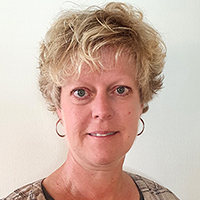WRAB 2023
WRAB 2023 - Conference theme: From early literacy learning to writing in professional life
18–22 February 2023 in Trondheim, Norway
The 2023 Writing Research Across Borders VI was hosted by the Norwegian University of Science and Technology (NTNU), Norway.
From early literacy learning to writing in professional life
The theme for the conference is From early literacy learning to writing in professional life. We believe that it mirrors the research interest of WRAB, and we know that it captures the broadness of writing research at NTNU as well as in the Nordic countries.
Keynote speakers

Professor Karen Harris, Arizona State University
Literacy from the Viewpoint of SRSD, an Evidence-based Approach to Writing Instruction from Kindergarten to College: Lessons Learned and Policy Implications
Across the U.S., several countries in Europe- including Norway, Australia, and other countries, there is deep concern that our students are not learning what they need to be able to write to communicate clearly, support personal development and goals, learn, and succeed at work or other settings. Over 170 studies of the Self-Regulated Strategy Development (SRSD) instructional approach for teaching writing have been conducted from grades 1 to 12, across several countries, and by multiple research teams. Meta-analyses have consistently shown that SRSD achieves significantly higher effect sizes, or impact on learning to write, than any other researched instructional approaches in writing. SRSD has been deemed an evidence-based practice for students in inclusive classrooms and students with special needs in writing by four independent groups, including the U.S. government What Works Clearinghouse. Further, a set of 21 studies in the U.S., Portugal, and Spain indicate that with strong PD, teachers can use SRSD instruction with high fidelity. Further, student outcomes are significant, with effect sizes across differing outcomes typically medium to large.
SRSD instruction in writing, however, is facing significant challenges in scaling up in schools. Educators and policymakers face significant challenges and barriers in getting evidence-based practices (EBPs) in writing into schools, some of which will be identified based on SRSD research and practice in three countries. Despite these challenges, policy leaders, researchers, organizations, educators, and others must share the responsibility for keeping education in the foreground. Together, we must establish a clear understanding of why research in education, including research on EBPs, is critical to our nations’ interests. For EBPs to be transformative in education, as they have been in medicine and agriculture, effective partnerships between policymakers and those invested in education, our students, and our schools are critical.

Associate Professor Sinead Harmey, University College London
"Change over time in young children’s writing: from what to how"
Many studies of early writing examine what changes in the written texts that children produce with little attention to the types of support they received and the actions they took. In terms of early writing development, cross-sectional studies are typical and conducted at group level over wide time spans to make inferences about what changes in how young children write (McNaughton, 2011).
In this keynote session I argue that that it is important to interrogate how changes occur both in what children write as well as how they write within instructional contexts, particularly for those experiencing difficulty. This provides the unusual lens described by Clay (2001) that can clarify the course of writing development that, in turn, can better inform early literacy.
In this keynote session, I traverse a corpus of my research that aimed to describe what children wrote and how they wrote in a co-constructed setting. I start with a critical review of early writing research methodologies that allows research to describe change in a more nuanced way. This line of inquiry, in turn led to the validation of a tool to describe change over time in early writing products and behaviours which I will discuss. I then present findings from a study that examined how changes occurred in what children wrote in the context of an early literacy intervention. In particular, I focus on children’s actions as they wrote and the types of instruction that appeared to support and/or constrain progress. I conclude by considering future directions for early writing researchers and the opportunities and benefits of interdisciplinary collaboration.

Professor Mary Macken-Horarik, Australian Catholic University
"Thresholds that matter in writing development: An argument from response texts"
This paper has had a long gestation. Drawing on written response texts produced by students in formal assessment contexts between 1986 and 2015, it explores the semantic character of strategies students adopt in responding to narrative and the consequences for achievement. With questions like ‘Why do you think the story ends in this way?’ or ‘What do you think the story is about?’ students tend to adopt tactical, diegetic or semiotic strategies in crafting a response. Although all are plausible responses to open-ended tasks, they are differently valued by teacher-examiners. Some strategies (and forms of wording) are more valuable (if only because more valued) than others. A systemic functional perspective on texts highlights preferences for meaning associated with each strategy and with forms of reasoning students currently employ as they account for narrativity. My analyses over several years revealed a trajectory of development implicit in tactical, diegetic and semiotic readings such that later strategies of response appeared to imply mastery of earlier ones. This insight proved useful to teachers keen to help students move from one threshold to another in their interpretive strategies. Following an overview of linguistic features associated with each response strategy, I report on findings from a research study exploring the impact of semiotic readings of narrative on students’ writing. I compare earlier and later response strategies in students in primary and secondary English and consider the value of a semantically oriented framework for diagnosing and fostering development in writing.

Professor Anna-Malin Karlsson, Stockholms universitet
"What does multimodality mean for writing research, and for literacy across the lifespan?"
The multimodal turn in discourse analysis and literacy studies now lies a number of decades back in time. Today, nobody would argue that written meaning-making is only about language, and nobody would deny that learning to write to a large extent is a question of mastering visual resources. Still, multimodality tends to be treated as an optional perspective in research – and I would say also in teaching. There seems to be a silent agreement about language playing the key part in the social practices of reading and writing, and in being literate. This may be so, but shouldn’t we then attempt to understand why, and to what extent this key position of language is dependent on other modalities? I have earlier pursued similar questions with a focus on language as a system, then within the theoretical framework of social semiotics (Karlsson 2012). I then argued that multimodality shows that language is not a full and symmetric system, but rather incomplete and asymmetric. What happens if we look at the scope of writing research through the same lens?
In this talk, I will review research – by myself and others – of written, and multimodal, meaning-making in different social settings: in school, in workplaces and in health communication. I do not wish only to apply a “a multimodal perspective”, or to study the visual and material per se, but rather aim at understanding what multimodality does to writing, to written discourse and to literacy. A number of examples will be explored at the level of the literacy event (e.g. Heath 1983, Barton & Hamilton 1998) – a meso-level take on context, that allows both mapping choices to available material resources and observing traces of culture and ideology. I will discuss how all writing practices are, to some extent, depending on other resources than language, and how acknowledging this may lead to a deeper understanding not only of the social practices of reading and writing, but also of the role of language. I will also discuss how a situated semiotic and interactional perspective, where the literacy event is in focus, may add to what can be learnt through ethnography and text analysis.

Professor Debra Myhill, University of Exeter, UK
"Talking, Thinking, Writing: The Importance of Metalinguistic Understanding in Becoming a Writer"
Kellogg argued that ‘to be successful, the instructor must teach the student how to think as well as write’ (Kellogg 1994, p.213), underlining that the act of writing is a process which requires attention not only to the production of written text, but also to the thinking processes which generate it. This presentation will address how talking and thinking are central to growth and development as a writer, and specifically, how thinking about grammar and language choices is critical to such development. Firstly, I will explore the theoretical concept of metalinguistic understanding and its (dis)connections with metacognition, and how it relates to learning and teaching writing. Then, drawing on a cumulative body of research over 15 years, I will outline how metalinguistic understanding can be supported in the classroom by adopting Halliday’s functional orientation to language, through explicit attention to grammatical choices and the rhetorical effects they generate. I will demonstrate how teachers can facilitate students’ metalinguistic understanding for writing: that is, students’ capacity to reflect on their language use, and to use that reflection to reason and make changes and choices in their own writing.
Organizing Committee
-
Arne Johannes Aasen Director
+47-73558905 +4797752967 arne.j.aasen@ntnu.no The Norwegian Centre for Writing Education and Research (The Writing Centre) -
Gustaf Bernhard Uno Skar Professor of Language Arts Education
+47-73412771 +4791693654 gustaf.b.skar@ntnu.no The Norwegian Centre for Writing Education and Research (The Writing Centre) -
Randi Solheim Professor
+47-73558904 +4747863231 randi.solheim@ntnu.no Department of Teacher Education